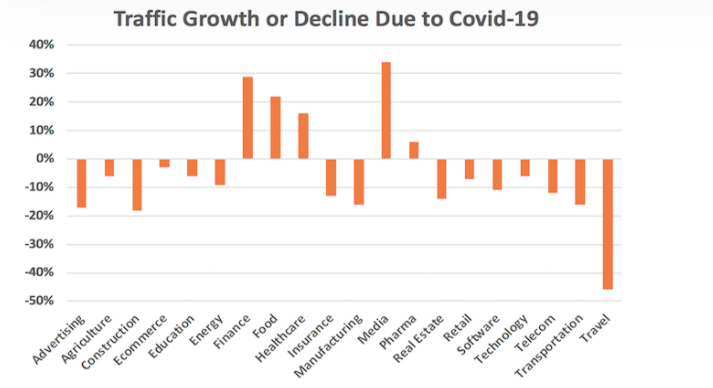The infectious Coronavirus pandemic threatens to destabilize global markets and today, any organization that fails to adapt to containment strategies like social distancing could suffer in the long-haul.
One of the most significant changes in business practices can be found at the level of marketing and advertising. Successful corporations such as IBM that typically allocate up to 40 percent of their advertising expenditure to on-ground and offline activities are now shifting to creating buzz around their company through interactive digital content. For example, IBM has transformed its annual marketing event into a virtual experience.
That being said, the Coronavirus pandemic that claimed more than 30,000 lives so far is forcing many companies to shift their promotional approach towards one that aims at curbing the spread of the virus, whether through raising more awareness or through useful content resources. But the Coronavirus is not just bringing that into the marketing scene. In fact, the spread of a virus that keeps everyone on their toes is making a significant proportion of consumers also believe it is unethical to advertise amidst the Coronavirus disease pandemic.

According to Kantar, a data insights and consultancy entity that recently surveyed 35,000 international consumers, approximately 70 percent of the respondents insisted that brands should stop issuing discounts or product promotion coupons, while another 74 percent said that companies must desist from exploiting the disastrous loss of lives.
Clearly, there is a socially constructed code of conduct that marketers are currently expected to follow—and the following are the most important items on that list.
Negative Marketing Habits:
1. Do not exploit fear

This is the cardinal rule of marketing. Let’s look at people planning to purchase vast amounts of hand sanitizer and masks for the purpose of hoarding and future reselling on marketplaces like Amazon and eBay. For these people we’re saying: please don’t.
By exploiting people’s fear for profit, you are diverting resources away from the elderly and chronically ill cohorts whose risks of dying from the novel Coronavirus are high.
If your company is planning similar profit-making ventures, then your business activities are not only unethical but also near-sighted. These are the type of strategies that people come up with when in panic mode.
2. Do not panic yourself
Expect your bottom-line to shrink for a while—organic traffic and conversion rates are already down in most sectors of the economy. Every market will struggle as businesses continue to make up for social distancing-associated losses, even in China, where factories have already been given the green light to resume production.
Chinese authorities reported a reduction of 20 percent in retail sales and an increase in unemployment due to the nationwide shutdown.
The tourism industry is also poised to lose more than $800 billion in revenues as prominent airlines like Virgin Atlantic laid off most of their staff. In fact, the Coronavirus disease pandemic will cost the world at least $2 trillion before the outbreak is contained.
Marketers should expect poor economic performance to negatively impact their organic traffic and conversion rates, and understand that panicking is not an option. The following chart illustrates that every industry, except for the finance, food, healthcare, and media sectors, will experience a decline in traffic growth.

As demonstrated in the following chart, conversion rates decrease with a decline in organic traffic.
What should you do when you can neither panic nor exploit fear?
Positive Marketing Habits:
1. Double down on content marketing investments
First of all, greed does not overrule the cardinal rule of content marketing: do not exploit fear. Second, Warren Buffet said that as people panic because the global economy is about to lose more than $2 trillion, you should be greedy and double down on your content marketing investments.
According to Loop Capital Marketers, Google Ads could lose up to 20 percent of its quarter 1 and 2 projected earnings. Facebook has also reduced its earnings projection by about 45 percent because they expect their travel, entertainment, retail, and customer-packaged commodities advertising ventures to take the biggest hit during the ongoing economic shutdown.
Therefore, content marketers have little to no competition; they are even more likely to receive deals like price reductions since the demand for digital ads such as pay-per-click is low. From buying out media companies struggling to pay their debt to redirecting offline marketing budgets to social media campaigns, you have endless opportunities (now more than ever) to increase your market share.

2. Increase your content marketing budget

Considering the fact that governments all over the world have banned gatherings of more than two individuals, online tools like SEO and video are currently your safest bet. Regardless of what you earn from your business, dedicate between 7 and 10 percent of your company’s gross revenues to content marketing.
In fact, 7 percent is the bare minimum because it is only enough to cover maintenance tasks like content audits and UX redesigns. If your budget is too tight, then you can redirect resources from other ventures like paid offline advertising.
For instance, you can decide to stop attracting customers to your location using TV ads and focus on online delivery solutions.
Additionally, there is no better time for you to handle all the possibly influential marketing and SEO-related tasks you have always been too busy to tackle—especially if they will contribute to your consumer-targeting goals.
3. Hyper-target! Hyper-target! Hyper-target!
The bad news is that people can no longer travel freely for the next few weeks. The good news is that content marketers can still successfully target consumers within driving distances. This is especially true for the tourism industry—the biggest losers when social contact is prohibited worldwide.
Content marketers should shift their attention to demographics like tourists who have been oblivious to local attractions, and design vacation (staycation) packages or digital museum experiences that appeal to them. You can hyper-target your awareness campaigns using Google’s paid search function as the intention is to reach out to as many people, within a driving distance, as possible.
You can also plan webinars to introduce new products or features in the market and follow in the footsteps of the likes of IBM that had to cancel an annual event.
Other than targeting your nearest customers, you also have to concentrate on areas like China and New Zealand that have succeeded in reducing the massive loss of lives and ended economic shutdowns. For instance, flights between New Zealand and China have significantly increased since the sharp declines experienced in January.
According to Craig Paddock, a representative of a prominent global integrated hospitality and travel marketing consultancy called MMGY Global, despite the shocking newspaper headlines, the company can not say that absolutely no tourist is purchasing their vacation packages. Americas at Sojern’s vice president also said that the decrease in the number of consumers means that the value of each customer has increased exponentially.
4. Establish an impressive online experience
As companies like Nike and Apple close their brick-and-mortar stores in compliance with state regulations, the value of impressive online experiences escalates. Usually, the web experience competes with retail storefronts as it aims to reduce the number of new and recurring customers who require physical contact to make purchases. Currently, all the attention has shifted to e-commerce as every organization strives to establish a seamless path to sales and reduce any complexities that could hinder conversion—and so should you.
Should you decide to advertise on your landing page, make sure that the content is not just absolutely relevant to consumers, but also conscious about the health and financial risks of the novel Coronavirus disease.
It is also important for your company to issue clear, updated insights about the organization’s response to the pandemic. Nobody wants to buy goods from entities whose business practices hinder the containment of Covid-19, so let them know about your positive contributions to society during the current outbreak. Some of this information can also be shared in your FAQs section to make it easier for consumers to gain access in real-time.
In a nutshell…
While there is a strong business case for shutting down the majority of your marketing plans and dismissing many members of your marketing team, it shouldn’t be like that.
Marketing can still be a successful venture amidst the Coronavirus pandemic; the trick is to be greedy while your competitors are still in panic mode. Concentrate on branding initiatives like webinars and pay-per-clicks and don’t ever underestimate the current value of hyper-targeting.
Whatever you do: do not panic or exploit people’s fear for profit; ensure you eliminate any needless physical contact as per your government’s directives and reach out to FastContent.co for all your content marketing needs!
Did you enjoy reading this blog?
This content has been written by top writers available on FastContent, Ureed.com’s newly launched content marketplace.
If you would like to order highly-converting and leads-generating content and receive it in 24 hours or less, click here to place a request.
Fast-order great content today!




